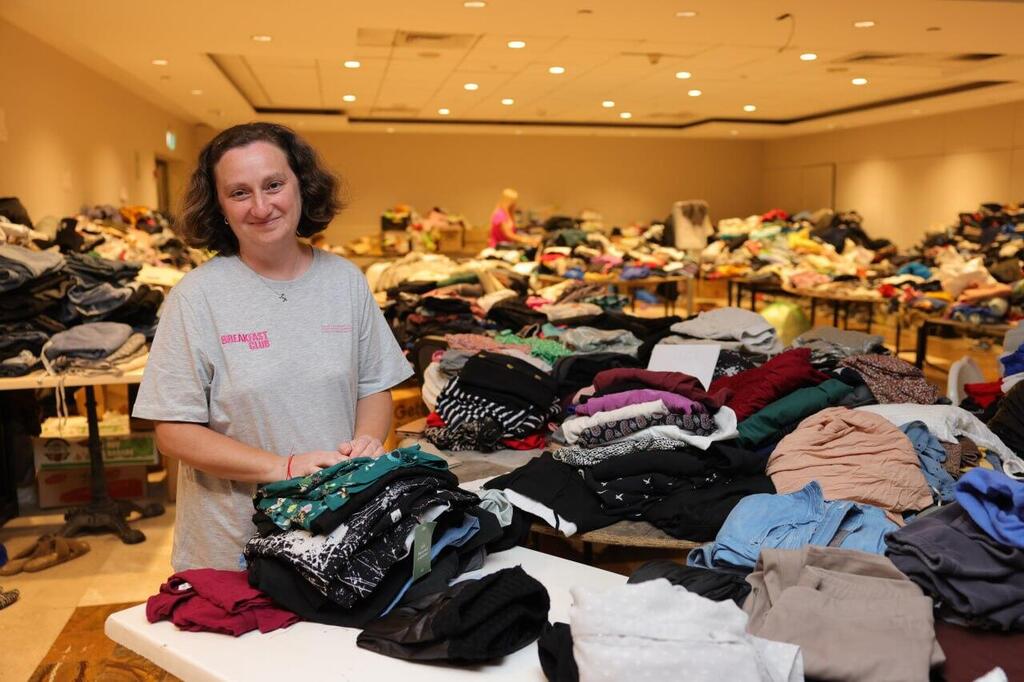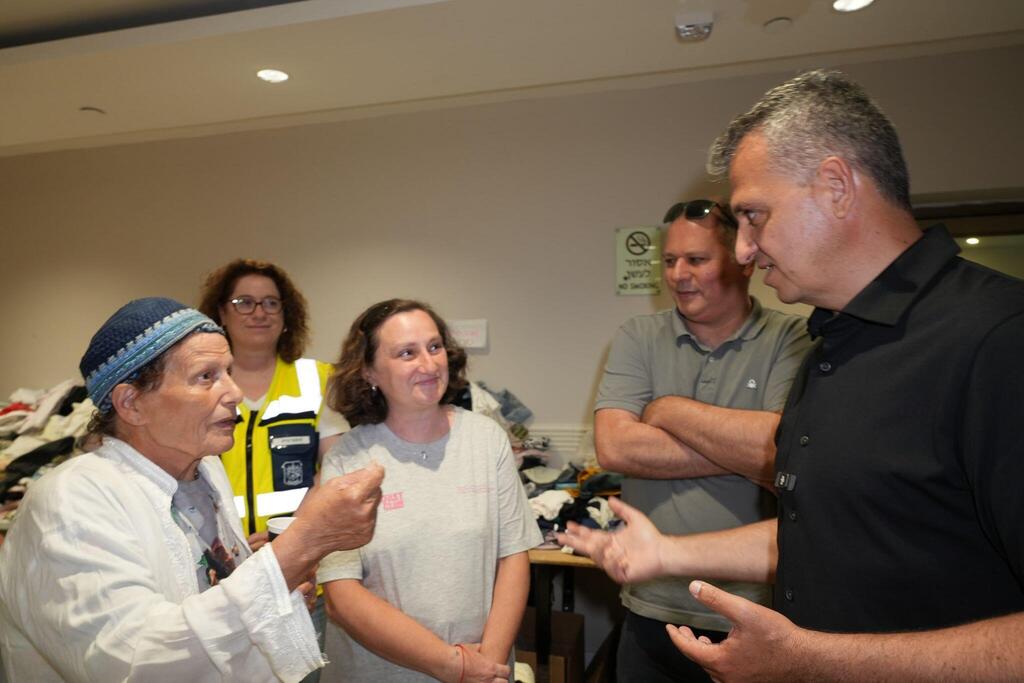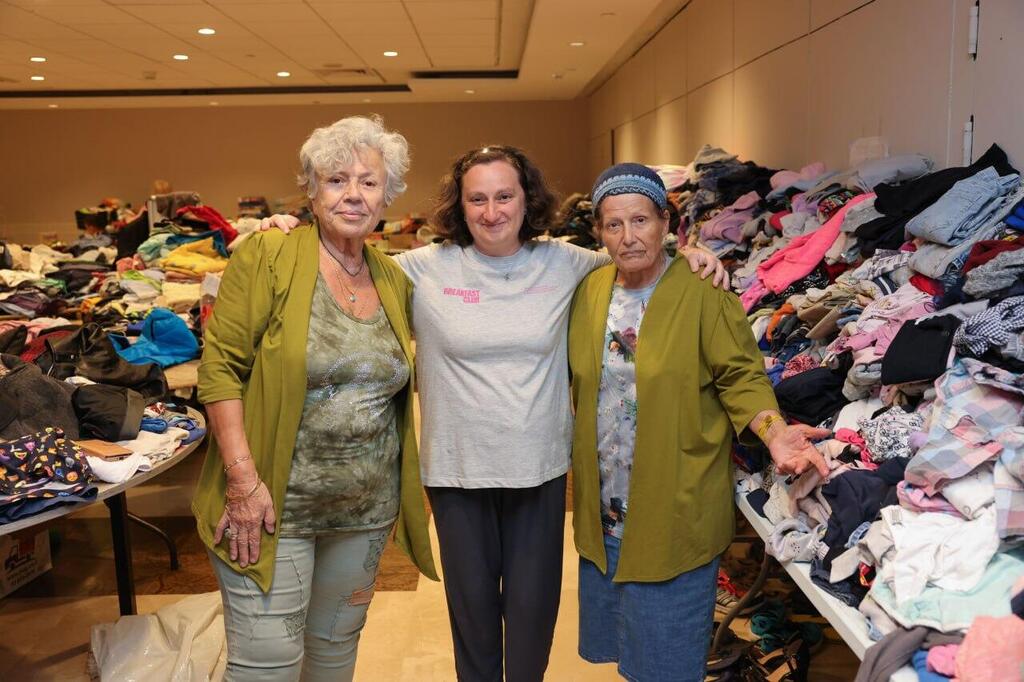Amid piles of donated clothing and supplies in the large hall at Kfar Maccabiah, Yelena Troufanov folds shirts and pants for families from Ramat Gan who were evacuated after their homes were struck by Iranian missiles. The same hands that once labored in a factory in Nir Oz—and have known both terror and captivity—now sort clothes and offer warm smiles. It’s a daily encounter between a woman who endured unimaginable horror and chose not to break, and people searching for hope in the heart of crisis.
On October 7, Yelena (50) lost her husband, Vitaly, in the Hamas massacre at Nir Oz. She was abducted to Gaza along with her mother Irina, her son Sasha, and Sasha’s partner, Sapir Cohen.
Yelena, her mother, and Sapir were released in the first hostage deal. Sasha was freed only this past February, after 498 harrowing days in Hamas’s tunnels. Since their return, they’ve been living at Kfar Maccabiah in Ramat Gan, where Yelena volunteers daily to support city residents whose homes were damaged by Iranian missile strikes.
Each day, she arrives at the donation center to sort and organize clothing for evacuees. “If I survived what I’ve been through and I’m here helping others—then anything is possible,” she says with quiet resolve. “The evacuees are happy to see me. They say it gives them hope.”
Troufanov is not alone. Dozens of volunteers work alongside her. “People brought things here from all over the country,” she says emotionally, eyes lighting up as she recounts how a business owner from Ashkelon donated brand-new items from her store. “This is the spirit of our people.”
When Ramat Gan’s mayor, Carmel Shama-Hacohen, visited the evacuees this week, he met Troufanov at the donation center and was deeply moved. “The emotional strength it takes to rise from the trauma she endured and still give back to others—supporting displaced families—is truly extraordinary.”
“If I can help others going through hard times, why wouldn’t I?” she adds, in her typically modest way.
“Bringing the hostages home is a moral obligation”
Even when sirens blare and rockets fall, Troufanov doesn’t stop. Though the current conflict with Iran brings back painful memories, it does not paralyze her. “I feel what most people feel—it’s difficult, no question. The whole country is sleep-deprived, people with young children, the elderly—we’re all running to bomb shelters every few hours.”
And yet, alongside the hardship, she holds onto deep hope. “I truly hope this operation ends swiftly and successfully—and, God willing, we can return to peace and calm in our land.”
Get the Ynetnews app on your smartphone: Google Play: https://bit.ly/4eJ37pE | Apple App Store: https://bit.ly/3ZL7iNv
Though she is no longer in direct contact with the hostage negotiators, she holds out hope that military gains will lead to a breakthrough. “I really hope the success of the current campaign with Iran helps bring all of our hostages home—and soon. They’re out of time. The living need a chance to heal, and the fallen deserve a proper burial in Israel. That is our moral duty.”
“Nir Oz is home”
Between volunteer shifts, even when the security situation is tense, Troufanov still makes the journey to Nir Oz to feed the kibbutz’s abandoned cats. “You can’t explain to cats, ‘Wait, there’s a war, it’s dangerous to go out.’ They want to eat every day—just like us.”
Without saying it outright, it’s clear that beyond her touching devotion to the animals left behind, this is also her way of staying connected—to her home, to the place where her husband was murdered and from where she was abducted, and perhaps most of all, to the beautiful memories that still linger.
Do you see yourself returning to live in Nir Oz?
“From the moment I was taken, I knew I’d come back to live there. Even in captivity, when the terrorists asked each of us where we’d go after release, I answered without hesitation: ‘I’m going back to Nir Oz.’”
Still, she faces a very human dilemma: Sasha and Sapir wish to remain in Ramat Gan, in the apartment they lived in before the abduction. But Yelena can’t sever her bond with the kibbutz. “On one hand, I want to stay close to my son. On the other hand, the kibbutz is my home—I can’t leave it,” she confides. “I’ll probably end up splitting my time between Ramat Gan and Nir Oz. I don’t know exactly how it’ll work yet, but I believe it’ll all come together in the end.”
And so, inside the donation hall at Kfar Maccabiah, surrounded by neatly folded clothes and families who’ve lost everything, Yelena Troufanov shows that even after the worst tragedies, one can still choose compassion. That even after the darkest captivity, one can still choose to give. And that even with a broken heart—it’s still possible to be the heart for others.




